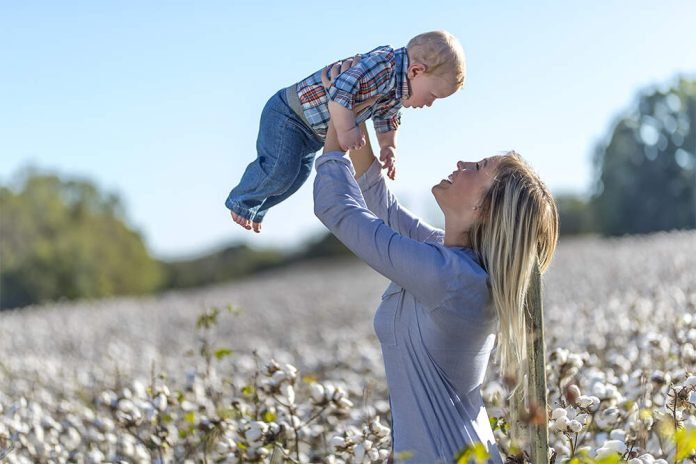Pakistan’s denim sector is at the forefront of supporting farmers in regenerative cotton farming. Several Pakistani denim mills are following this practice that is in vogue in other cotton-producing countries like Brazil, Australia, the US, and Turkey.
Several direct-to-farm programs have been set up in Pakistan, with support from denim mills. Their initial focus was often on organic cotton. Still, many are now shifting to the more holistic, or all-encompassing, scope of regenerative agriculture that covers both the preservation of natural ecosystems and supports local communities. This is the case at Interloop. “Building upon insights from the Interloop Organic Kapas initiative, launched in 2022, we are advancing towards regenerative cotton, embracing a comprehensive farming approach to revive and enrich the agricultural landscape in Pakistan,” says Faryal Sadiq, chief marketing officer. The new Interloop Regen Kapas programme is launching this year with 1,000 farmers and 5,000 acres, he tells Inside Denim.
Soorty’s Organic Cotton Initiative (SOCI) has successfully obtained organic certification in just two years and is much more than just a cotton growing programme, says Ebru Dabbag, its sales and marketing manager. “It also has a positive impact on farmers’ lives and on the field,” she says of the programme in Khuzdar in Balochistan. Soorty has since joined a regenerative cotton project in Bahawalpur, South Punjab, with REEDS Pakistan, the country’s regenagri certification partner. “We are working with smallholder cotton farmers who are the driving force behind building resilient and sustainable communities,” she says, adding that it has already registered 1,100 farmers covering 5,000 acres.
Large growers, such as Sheffer in Brazil and members of the US Cotton Trust Protocol in the United States, are adopting ‘climate positive’ farming practices that Good Earth, in Australia, has been championing for years. Standards are also becoming available, as would be expected. The assurances they offer brands could boost demand for cotton grown according to this holistic – and inherently diverse – form of agriculture.
Through support provided to them farmers offer mills a source of locally produced and fully traceable cotton fibre, they aim to be more than just a business transaction. These bottom-up initiatives are now shifting from organic to promote a practice that regenerates soil, favours biodiversity, stores carbon, and improves the livelihoods of indigenous farmers.
Turkey-based mill Maritas is working with a research programme with the Harran and Gaziantep Universities in the Harran region in the south of the country. In its first year, the cotton fibre yield made it possible to weave nearly 500,000 metres of fabric, a representative of the mill said. The programme will be expanded fivefold next season, potentially bringing the mill’s regenerative cotton capacity to 2.5 million metres, or 10 percent of its production.
One Brazilian denim manufacturer is betting on regenerative cotton and has an exclusive agreement with fellow Brazilian cotton grower Scheffer. In addition to reducing the use of chemical products, contributing to soil health, and promoting biodiversity, Scheffer’s regenerative cotton is rain-fed, and this helps lower the water footprint of the fabrics. Over the next five years, the mill plans to quintuple the volume of fabrics made from regenerative cotton, to nearly 15 percent of its total production. The company has also obtained regenagri certification for its three manufacturing sites in the northeast of the country.
Australian cotton grower Good Earth applies the principles of regenerative agriculture on its farms in the country, and its Sundown Pastoral Company is regenagri-certified. But the grower also claims that its cotton is “climate positive” as it sequesters more carbon than it emits, certified by Brisbane-based Carbon Friendly.
The development of regenerative agriculture is a source of some confusion as to its relation to organic produce. The two practices differ on some points, notably inputs, but their objectives do in many cases converge. The overlap between the two will only grow. A direct-to-farm system in which brands actively support indigenous smallholders in Andhra Pradesh, India, Raddis Cotton applies the principles of regenerative and organic agriculture with a view to achieve organic status. Raddis Cotton is regenerative cotton in conversion to organic
In addition to building the resilience of these indigenous communities, the organisation also seeks to bring greater transparency and traceability to the cotton supply chain. Farmers, for instance, are now being paid through bank transfers.
Spanish retailer Mango is taking its first steps in this direction through a partnership with Materra, a UK and India-based start-up that develops ‘climate-resilient’ cotton production systems, including a direct-to-farm regenerative cotton supply chain in India. Co:Farm, Materra’s digital platform, will enable the retailer to have full traceability of its cotton sourcing, from seed to garment, and to track data related to soil health, nutrients, water usage and plot size, among others.
Cotton growers in the United States are looking to apply regenerative farming practices with Climate Smart Cotton, a five-year programme that began in 2023 led by the U.S. Cotton Trust Protocol in collaboration with the Soil Health Institute (SHI) and other partners. Now SHI is defining regional soil health benchmarks to contextualize these soil health indicators, ultimately covering an area that represents 85 percent of the country’s cotton growing regions.It focuses on four indicators (from a starting point of thirty different soil health metrics) that will make it possible to assess the regenerative nature of cotton farming practices without imposing too many constraints on farmers.
In addition to Control Union’s regenagri and the Regenerative Organic Alliance’s Regenerative Organic Cotton (ROC) standard, the Aid by Trade Foundation is rolling out its own Regenerative Cotton Standard (RCS). Building on the foundation’s experience with its two other standards, Cotton made in Africa (CmiA) and Cotton made in Africa Organic, it claims to be the first regenerative cotton standard to prioritise the interests and knowledge of smallholder farmers.
From a practice rooted in tradition and location-specific (agri)cultures, regenerative farming is thus slowly being formalised into a more closely monitored, data-based practice that aligns with the needs of corporate concerns.



